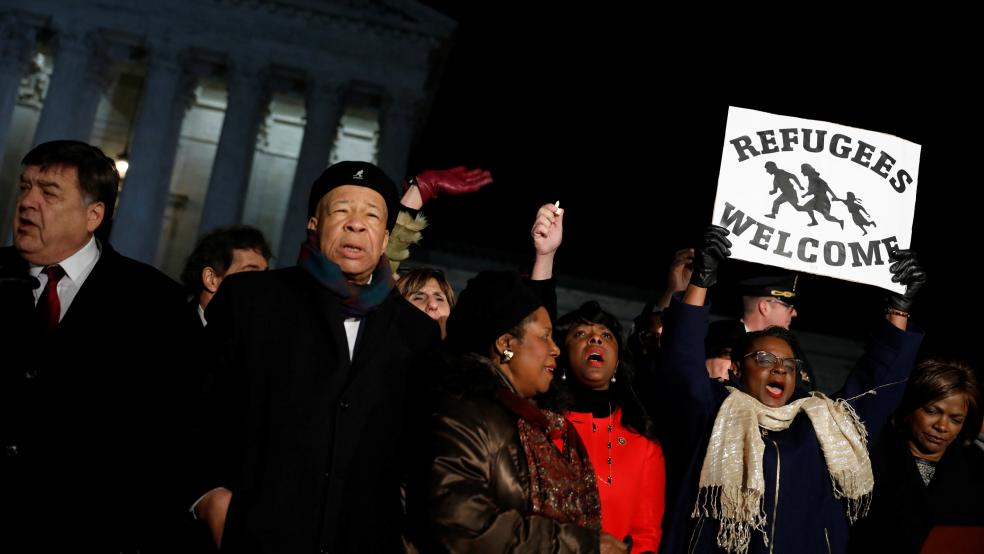Say what you will about former acting Attorney General Sally Yates’ refusal to enforce the Trump administration’s controversial executive order on immigration -- she’s being simultaneously hailed as a heroic defender of the Constitution and a grandstanding hack -- but her decision and subsequent firing late Monday speaks volumes about the bumbling start the Trump administration is off to in its first two weeks.
Yates, a career Justice Department employee, was left running the show at the Department of Justice after President Trump was inaugurated and former AG Loretta Lynch stepped down. On Monday, she released a memo to federal prosecutors informing them that in her judgment, the executive order banning refugees from entering the country and restricting travel from seven Muslim-majority countries was not constitutional. She instructed them not to defend it in court.
Related: Here’s Who Wins With Trump’s Order to Slash Regulations
The memo outlined her responsibility to assure that the Department’s actions are legal and “consistent with this institution’s solemn obligation to always seek justice and stand for what is right.”
She added, “At present, I am not convinced that the defense of the Executive Order is consistent with these responsibilities nor am I convinced that the Executive Order is lawful.” As long as she remained acting AG, she said, DOJ “will not present arguments in defense of the Executive Order.”
Unsurprisingly, she did not remain acting AG for very long. Yates was relieved of her job shortly afterward in a move the White House announced in a vituperative memo declaring that she had “betrayed” the Department of Justice and declared her “weak on borders and very weak on illegal immigration.”
Yates was promptly replaced with Dana Boente, the US Attorney for the Eastern District of Virginia, who said that he would instruct Justice Department attorneys to defend the executive order in court.
Related: Here’s the Big Threat to Americans That Trump Is Ignoring
White House officials were plainly furious with Yates. Trump senior adviser Stephen Miller appeared on Fox News and declared, “It can’t be stated strongly enough how reckless, irresponsible and improper the behavior was of the acting attorney general, Sally Yates, in refusing to defend the president’s order.” He insisted that the president’s action was legal and said that it had been cleared by the Justice Department Office of Legal Counsel.
The incident quickly drew somewhat overblown comparisons to former president Richard Nixon’s infamous Saturday Night Massacre, in which he worked his way through the resignations of top DOJ officials until he found one willing to fire Special Prosecutor Archibald Cox, who was investigating the Watergate scandal.
But where Nixon’s actions were sordid examples of an unscrupulous man willing to push the boundaries of legality to preserve his own power, the Yates firing was more a case of borderline incompetence creating unnecessary and embarrassing chaos.
The Trump administration is staffed with people who worked on the Trump presidential campaign, an undisciplined and chaotic affair that, though ultimately successful, triumphed in spite of its own missteps. They are now learning that the process of governing isn’t nearly as forgiving as the process of campaigning.
Related: Extreme Muslim Immigration Ban Suggests Bannon Is Running the White House
The immigration order was written with little or no input from the agencies that would be required to enforce it, and it was signed with no advance warning. Even a cursory attempt to take the temperature of the agencies on the front lines of immigration enforcement might have enabled the Trump administration to avoid significant embarrassment, but even that most basic step wasn’t taken.
That’s why, instead of quietly replacing Yates with Boente on, say, Friday -- something that administration had every ability to do -- they were forced to take emergency action on Monday.
The same lack of preparation is reflected in a stinging draft of a memo dissenting to the executive order that was signed by more than 100 career foreign service officers and made public on Monday morning. Again, early steps that might have tempered that reaction were not taken, and White House Press Secretary Sean Spicer was reduced to demanding that they “either get with the program or they can go.”
Setting aside the merits of the executive order as a legal or even moral matter, what we’re seeing here with regard to its rollout and implementation looks less like Nixonian malevolence and more like the basic incompetence of a new administration learning the hard way that it cannot govern the way it campaigned.





